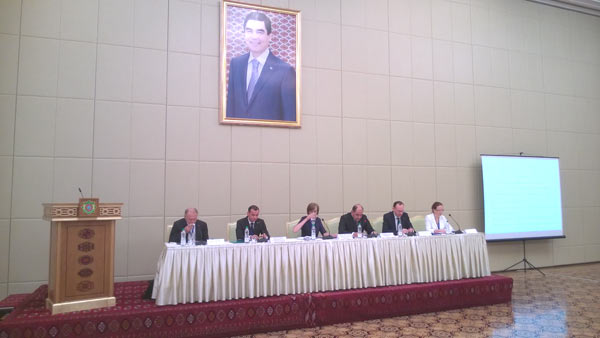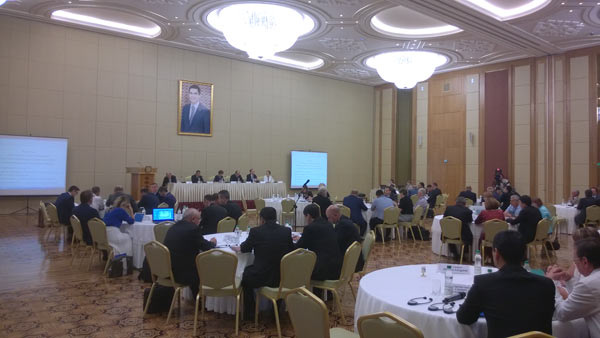ROUND TABLE TALKS ON THE COMING CHAIRMANSHIP OF TURKMENISTAN IN IFAS
The round table talks on the coming chairmanship of Turkmenistan in IFAS were held on the 23rd of August 2016 in Ashgabad.

The meeting was opened by Mr. Guizgeldi Baidjanov, Deputy Minister of Agriculture and Water Resources of Turkmenistan. Welcome speeches were delivered by:
- Djoshmurad Sedekov, Deputy Chairman, Committee for Environmental and Land Conservation, Turkmenistan
- Shukhrat Talipov, Acting Deputy Chairman of EC IFAS
- Margret Maria Uebber, Ambassador Extraordinary and Plenipotentiary of the Federal Republic of Germany to Turkmenistan
- Marton Krasznai, UNECE Regional Adviser
- Volker Frobarth, Transboundary Water Management in Central Asia, Programme Director, GIZ

The meeting started with the “Concept of Turkmenistan chairmanship in IFAS” presented on behalf of the Turkmen Ministry for Foreign Affairs by Mr. Mered Akmyradov, Turkmenistan’s representative at the Executive Committee of IFAS.
This Concept of Turkmenistan chairmanship in IFAS for 2016-2019 stipulates the following:
Program of actions to provide assistance to the countries of the Aral Sea basin (ASBP). New ASBP will include next focus areas:
- Integrated use of water resources
- Environment
- Socio-economic improvement in the region
- Improvement of IFAS institutional and legal mechanisms
The socio-economic focus area should include:
- Improvement of quality and sustainability of drinking water supply systems
- Establishment and development of small and medium enterprises in rural area
- Improvement of healthcare services
- Enhancement of quality and effectiveness of rural preschool and school education
The focus area of improvement of IFAS institutional and legal mechanisms is to solve problems related to institutional development, legal framework and capacities of IFAS regional bodies.
Mr. Abaev, Head of Water Use Division at the Ministry of Agriculture and Water Resources (Turkmenistan) made presentation on the “Elaboration of a new Program of actions to provide assistance to the countries of the Aral Sea basin (ASBP) – Integrated use of water resources”. He underlined that the focus area on integrated use of water resources will include projects related to transboundary water management, irrigated land reclamation, new water conservation technologies, irrigation system performance improvement, monitoring systems and databases, modeling, basin plans, and hydraulic structure safety.
Mr. M.Durikov, Director of the Scientific-Information Center, Interstate Commission for Sustainable Development, presented “Regional plan of actions on environmental conservation (RPAEC) as a single environmental program for the Central Asian countries”. He noted, particularly, that:
- it was necessary to focus on environmental matters in IFAS activities. In 2003, as part of ICSD activity, a Regional plan of actions on environmental conservation was developed and approved as a single environmental program for the Central Asian countries;
- however, till present, most of the projects included in this plan, have not been implemented due to a lack of financing;
- it was advisably to revisit the RPAEC and start working with donors to implement the program.
Mr. Durikov in his report also underlined that it was very important to create such a financial and legal mechanism in the region that considered the interests of all the states in the water and energy balance. A guiding document in making decisions in this matter could be a Central Asian Water Strategy developed by the riparian countries. This strategy should lay main guiding principles and rules in the interests of all states in the region. All environmental provisions in this document would be the basis for policy decision making among the states.
With the UNEP support a Framework Convention on Environmental Protection for Sustainable Development in Central Asia was developed. It is necessary to stress that the Convention will help to integrate legislative frameworks and mechanisms of existing interstate agreements in this area, formulate additional priorities, and identify prospects of continued regional cooperation for sustainable development in CA countries. Coordination activity of Turkmenistan during its chairmanship in IFAS will be directed at socio-economic and environmental improvement in the Aral Sea basin and at sustainable use of its natural resources with the aim of achievement of Sustainable Development Goals.
Also it is proposed to establish a Regional Center for Climate Change related Problems under umbrella of IFAS. The main objectives of the Regional Center will be encouraging technical cooperation and stepping up development and transfer of technologies, developing and implementing relevant programs and projects, and assisting the Central Asian and Caspian region countries based on their requests and according to their potential, national conditions and priorities.
The second part of the round table was dedicated to the role of international organizations in IFAS activity. The following presentations were made during the session:
“Results achieved in the “Transboundary Water Management in Central Asia” Programme, Berlin Process, phases I-II and projects planned for phase III for 2015-2017 (V. Frobarth)
“Cooperation of the UN Regional Center for Preventive Diplomacy for Central Asia (UNRCCA) with IFAS for assistance to Central Asian countries in transboundary water management in the Aral Sea basin” (P.Draganov, Special Representative of the United Nations Secretary-General for Central Asia, the Head of the UN Regional Center for Preventive Diplomacy for Central Asia).
“Global water partnership – a neutral platform for water and sustainable development knowledge” (V.Sokolov, Regional Coordinator of Global Water Partnership for Central Asia and Caucasus - GWP CACENA)
“Possibilities to enhance EC IFAS through regional cooperation: CAREC case-study” (I.Abdullaev, Executive Director, Central Asian Regional Environmental Center).
“Water and environmental cooperation between the World Bank Group and Turkmenistan” (S.Dzhepbarov, Acting manager for Turkmenistan, World Bank)
“Environmental conservation and sustainable development in Central Asia – UNEP supported processes” (N.Alexeeva, Head of Sub-regional office of UN Environmental Program for Central Asia)
Presentation on forthcoming activities of the EU WECOOP II Project (R. Bosch, project officer)
“UNDP collaborative activities in the area of environmental conservation and water management” (R.Nurmukhamedov, Head of environmental and energy program, UNDP)
Representatives of the European Union, UNECE, and Swiss Development and Cooperation Agency (SDC) also took the floor.
Other participants also contributed to the debate:
Shukhrat Talipov (EC IFAS Turkmenistan) who noted that RPAEC should be linked with ASBP-3, especially with its water-related components. The report on implementation of ASBP-3 is available on the EC IFAS web-site. In future work, one should take into account the shortcomings related to monitoring of implementation of programs under the aegis of IFAS.
Saghit Ibatullin (ex-Chairman of EC IFAS, Kazakhstan) thanked Uzbekistan for strong governance of IFAS during the last three-year period. He pointed to a need for development of a common information space under umbrella of IFAS in order to enhance regional cooperation. Attention should also be paid to coordination among international donors.
Normukhamad Sheraliev (Ministry of Agriculture and Water Resources of Uzbekistan) noted that Turkmenistan faced a difficult task to rejoin Kyrgyzstan to living cooperation under umbrella of IFAS. The new IFAS strategy should be based on those areas that were already approved by the Heads of State and be concise and well-defined.
|